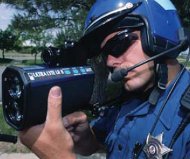5/19/2011
Ohio Appeals Court Tosses Laser Ticket Over Model NumberOhio Court of Appeals overturns a speeding ticket over an incorrect laser gun model number.

Cincinnati motorist Thomas H. Starks spent nearly a year fighting a $150 speeding ticket he received from the Ohio State Highway Patrol. On Monday the arguments he made on his own behalf were vindicated by the state's second-highest court. A three-judge panel threw out evidence provided by a Laser Technology Inc (LTI) UltraLyte laser speed gun on the grounds that state officials never bothered to certify its accuracy. Instead, they just assumed the certification of an older model, the LTI 20-20, would suffice.
Starks would not let that difference slide past the judge. On June 24, 2010, Trooper Eric Witmeyer had accused Starks of speeding on Interstate 75 in Franklin Township where the speed limit had been reduced to 55 MPH. Starks was put on trial on July 23, 2010. Starks insisted that the state had to prove the device was properly certified.
"There is, there's no documentation of a... hearing in this jurisdiction that... laser gun type device is accurate to a legal degree of certainty and admissible as scientific evidence to a speeding violation," Starks argued before the municipal court. "Unless the prosecution intends to bring in expert testimony from a recognized expert in the field, I object to any testimony concerning reading from a laser speed laser device."
The trial judge overruled the objection, claiming the appeals court had approved the LTI UltraLyte. Starks was ordered to pay the fine plus court costs. The unanimous appellate panel stated it had never approved the UltraLyte.
"This court has previously recognized that a trial court may take judicial notice of the scientific reliability of the LTI 20-20 laser device," Judge Robin N. Piper wrote for the court. "However, we have not recognized the reliability of the LTI UltraLyte. In addition, our survey of the reported municipal court case law in this district has not revealed a decision that has considered the scientific reliability of this particular device."
The panel rejected the notion that the scientific principle that allows one gun to be admitted into evidence automatically applies to a separate device.
"In this case, however, there was no testimony from Trooper Witmeyer that the LTI 20-20 and the LTI UltraLyte operated under the same scientific principle such that they could be deemed different models of the same device," Piper wrote. "As a result, we conclude that the trial court erred in taking judicial notice of the LTI UltraLyte laser absent expert testimony with regard to its reliability."
As a non-lawyer, Starks failed to follow the proper legal procedure of moving to strike the police officer's testimony, but the appellate judges agreed that this did not matter because he had been convicted based on "plain error." Trooper Witmeyer failed to establish his credentials for visually estimating speed, so the court found no admissible evidence remained.
A copy of the decision is available in a 40k PDF file at the source link below.


